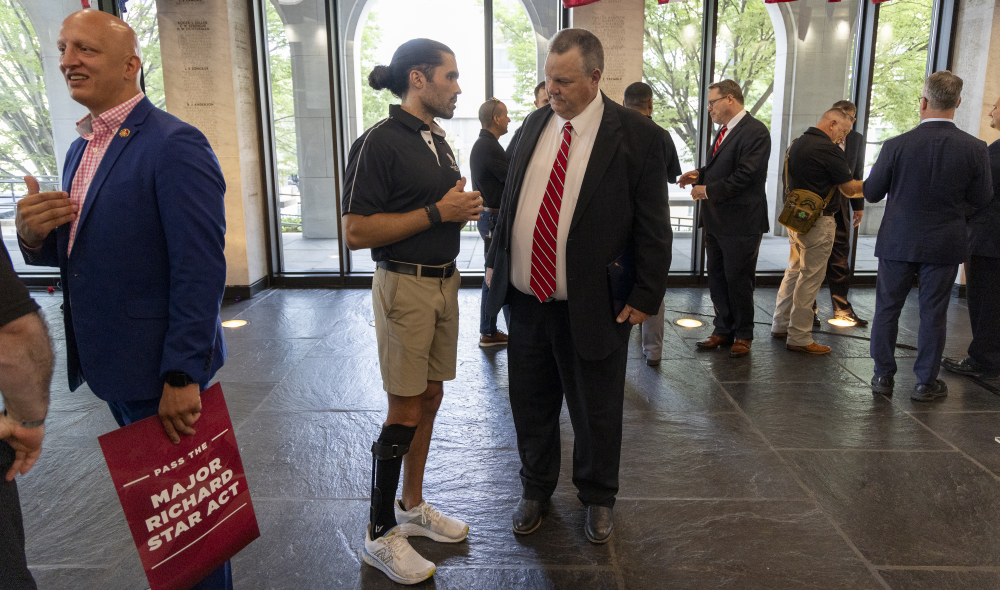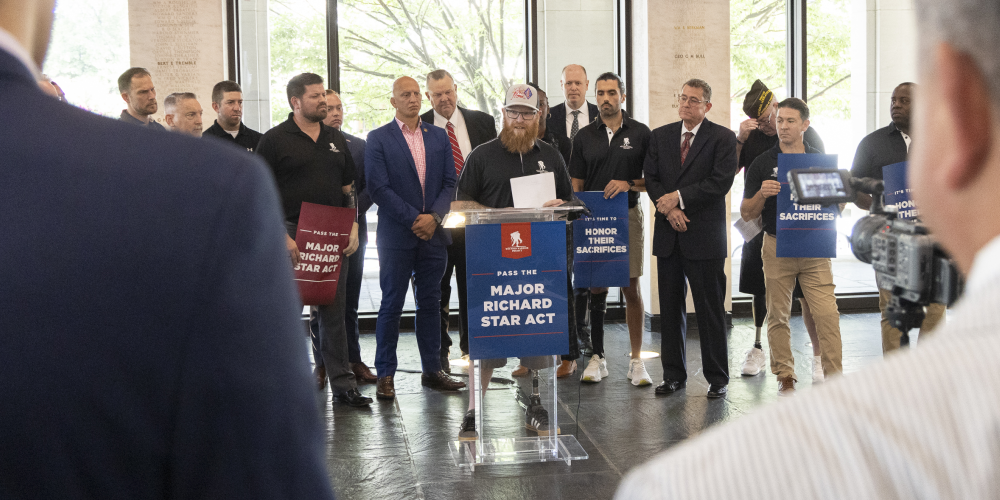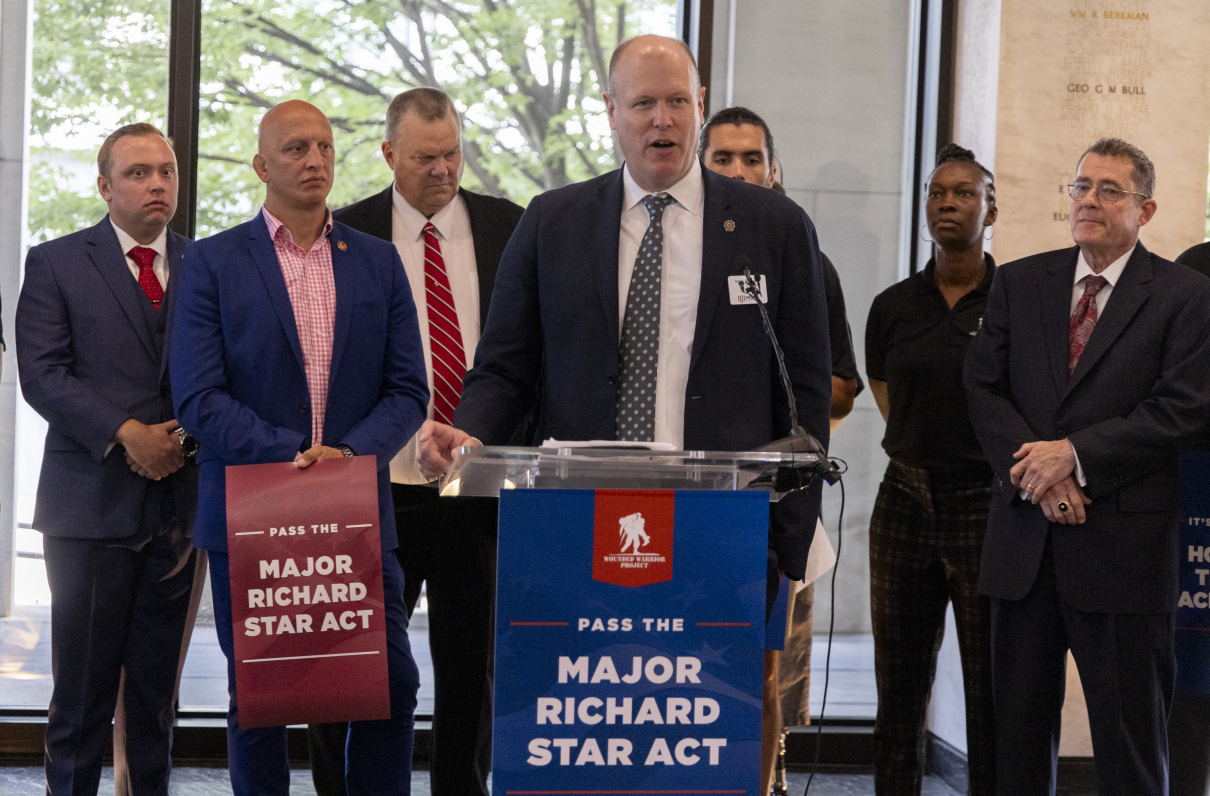MOAA joined fellow military and veteran advocacy groups alongside combat-wounded veterans July 10 on Capitol Hill for a series of meetings with legislators – a final push to include language helping tens of thousands of injured retirees as part of the must-pass FY 2025 National Defense Authorization Act (NDAA).
“Saving money on the backs of our combat injured is a problem Congress can fix this year,” said Lt. Col. Mark Belinsky, USA (Ret), MOAA's director of Government Relations for Currently Serving and Retired Affairs. “With two-thirds of Congress in support of the Star Act, it is time for leaders to allow a vote for inclusion in the NDAA.”
[TAKE ACTION: Ask Your Senators to Support the Major Richard Star Act]
Belinsky delivered remarks at a press conference at Reserve Organization of America headquarters alongside fellow advocates, injured veterans, and Senate Veterans’ Affairs Committee Chairman Sen. Jon Tester (D-Mont.), who has staunchly supported the bipartisan Major Richard Star Act.
“With our all-volunteer military that we have today, now more than ever we need to live up to the promises we made our fighting men and women,” Tester said. “Why? Because quite frankly we are in the most dangerous time worldwide … since the Cuban Missile Crisis, and I was 6 years old.”
The bill would end an unjust offset which costs combat-injured retirees a dollar of DoD-provided retirement pay for every dollar of VA-provided disability compensation. Tester introduced the Senate version of the bill in February 2023; since then, thanks in large part to the grassroots efforts of MOAA members and other supporters, it has garnered 73 co-sponsors. The House version, introduced by Rep. Gus Bilirakis (R-Fla.), has more than 325 co-sponsors.

Sen. Jon Tester (D-Mont.), right, speaks with Capt. Patrick Nugent, USMC (Ret), at a July 10 press event supporting the Major Richard Star Act. (Photo by Mike Morones/MOAA)
[MILITARY.COM COVERAGE: Disabled Veterans to Congress: Move Out on Stalled Bill to Allow Payment of Both Retirement and Disability Benefits]
Despite the bill’s overwhelming support, budgetary and procedural concerns have prevented the measure from becoming law. Including the bill’s text in the NDAA would clear some of these hurdles, but the House effort stalled when some of the bill’s sponsors voted against it in a key committee hearing, and the version crafted by the Senate Armed Services Committee does not include the measure.
[RELATED: Pay, Health Care, and More: How the House and Senate NDAA Versions Stack Up]
That leaves a Senate floor vote as the last clear path for the bill’s text to be part of the NDAA as it enters the House-Senate conference process.
“For veterans who have been combat injured before 20 years of service in our military, we’re not doing right by them,” Tester said.

Lance Cpl. Alex Nicoll, USMC (Ret), who suffered severe injuries in a firefight in Fallujah, Iraq, in 2004, speaks during the July 10 press event. (Photo by Mike Morones/MOAA)
Stories of Sacrifice
The Wounded Warrior Project flew in combat-wounded veterans from across the country to share their stories and put a face to those who would benefit from the measure:
Lance Cpl. Alex Nicoll, USMC (Ret)
Nicoll was shot seven times and hit with a grenade on his third combat deployment. He was caught in a Fallujah firefight in 2004 that would become known as “Hell House.” The Marine lost a leg and was forced to medically retire. He now works as a motorcycle mechanic in Kentucky.
Nicoll said the retirement pay would have helped his transition out of service, which included two years living out of his car and an overwhelming sense of isolation.
“I did not join the military for benefits. No one joins to get rich. I joined because I thought I was the toughest this country had to offer. I joined to kick down doors and sleep in fighting holes,” he said. “And I couldn’t tell you back then how the military would take care of me if I had got hurt or what my benefits would be. But I did know, even then, that our country promises to take care of our veterans.”
Sgt. Michael Owens, USMC (Ret)
Owens was manning a .50-cal on a 7-ton truck in Iraq in 2005 when the driver hit a pit made by an IED and lost control. The vehicle rolled over, Owens lost his right arm and his legs were shattered.
“Directly out of surgery one of the first things I said to my command was ‘Don’t make me get out. I don’t want to get out,’” he said. “Sadly, I was found unfit for duty.”
He’s had a total of 35 surgeries and now teaches adaptive sports for the Wounded Warrior Project in San Antonio.
Spc. Danielle Green, USA (Ret)
Green spent about 15 months in uniform with hopes to make a career of it and go officer. She was struck by a rocket-propelled grenade while manning a police station roof in Iraq. She lost her left-dominant arm.
“We’ve got 53,000 veterans that earned these benefits … that have endured a hardship,” she said. “So, we’ve got to make this right, Congress. And I don’t know what’s stalling it, but then you wonder why our young people don’t want to serve today.”
How You Can Help
Senate floor action on the NDAA is set for this month. Securing the Star Act’s inclusion in this must-pass legislation offers the last, best hope for a long-sought fix to benefit tens of thousands of combat-injured veterans.
Even if you’ve already reached out to your senators on this issue, please visit MOAA’s Legislative Action Center and do so again in the coming days. This election year, it’s critical for lawmakers to understand their constituents expect actions, not just words, in support of those who serve.
You can also connect with your senators’ offices via MOAA's toll-free line to the U.S. Capitol switchboard – 866-272-MOAA (6622). Ask to speak with the military legislative assistant. Use these talking points, or refer to MOAA’s Star Act one-pager for additional materials.
When MOAA Speaks, Congress Listens
Learn more about MOAA’s key advocacy issues, and contact your elected officials using our messaging platform.

